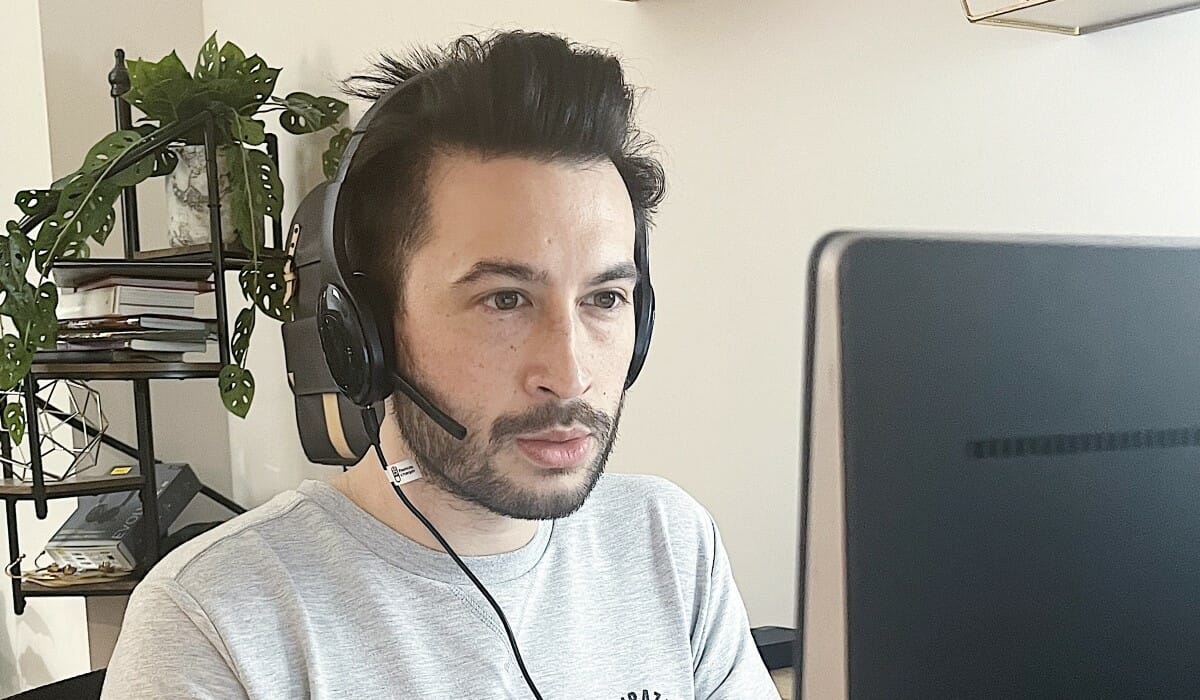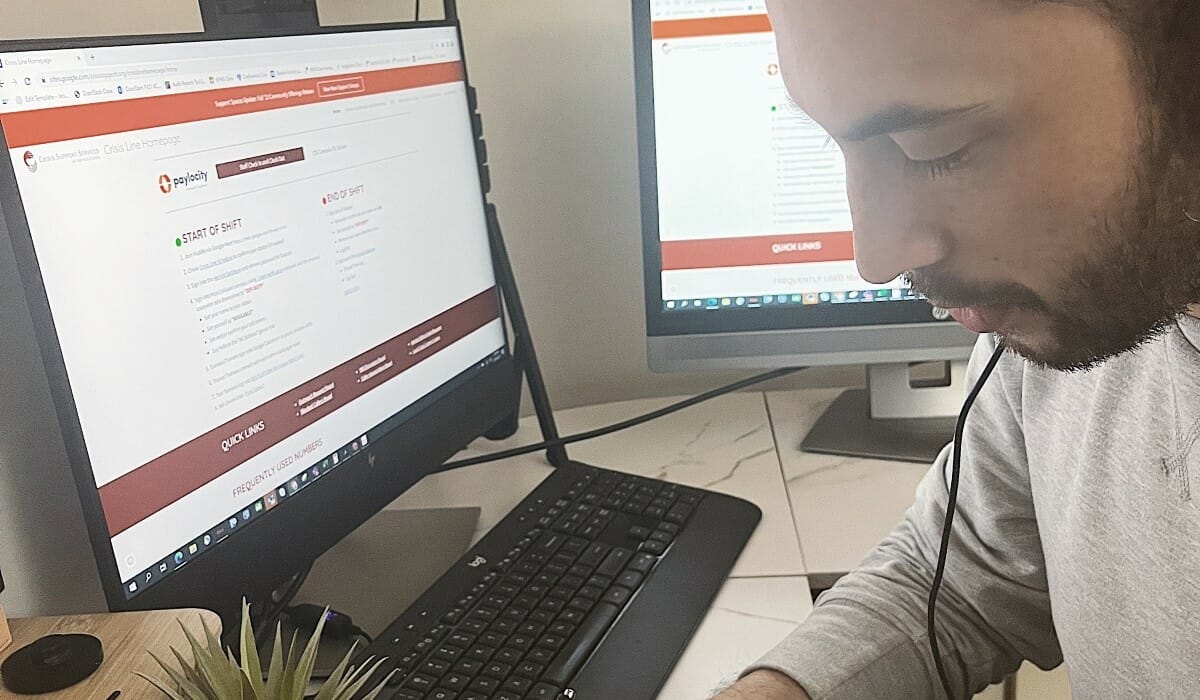Overcoming Fear to Become a Crisis Hotline Counselor

Meet Daily Point of Light Award honoree Alexander Kong. Read his story and nominate an outstanding volunteer or family as a Daily Point of Light.
Content Warning: Points of Light is proud to share the following uplifting and inspiring story. However, we acknowledge that a small portion below may be difficult for some readers. We encourage you to please care for your own wellbeing above all.
During college, Alex worked at a Neuropsychiatric and Behavioral Health Institute where he was exposed to mental health in an outpatient setting. He found it a refreshing change from his Business Economics major. After graduation, Alex began working full time as a public accountant and lost touch with his interest and direct exposure to mental health. However, he would often see signs for the 1-800-273-TALK line (now known as the National Lifeline 988 number) on his commute, and wonder what it would be like being on the other side of the line helping someone through a crisis.
He continued seeing the signs, and the hotline number often showed up on public transportation. His interest was rekindled, but Alex didn’t know whether he had the right skillset to be a crisis counselor and felt intimidated by the thought. His fears prevented Alex from pursuing this journey sooner. Alex sat with these thoughts for a few years, ruminating and thinking about signing up to volunteer, but he didn’t feel brave enough to actually commit.
An incident that occurred at work changed everything. One day, he supported a co-worker who was going through a crisis. He had never dealt with an individual going through a crisis and was unaware of the right protocols to follow or best words to say. Alex simply relied on his instincts in order to ensure the individual felt safe and supported as they made it through their moment of crisis. After the incident, Alex reflected on the situation with other co-workers. Some pointed out Alex’s calm demeanor and natural ability to deal with stressful and anxious situations. Others weighed in as well, voicing their agreement. This prompted Alex to look at himself a bit differently and provided him with the confidence to sign up to be a volunteer, to take a chance and try something new. Shortly after, Alex started volunteering as a phone counselor.
What inspires you to volunteer?
I originally was inspired to begin volunteering given my personal desire to learn more about mental health and learn a new skillset that was outside of my comfort zone. Mental health had always been something that I was interested in, but my own personal knowledge was fairly limited. I was also held back by fear of the unknown – fear of not knowing whether I would be able to pick up a new skillset that was so different, and fear of not knowing how to support others. These fears did hold me back for a bit, but with the encouragement of others, I was able to push past these internal fears and was inspired to continue a mental health journey I had started back in college but put on pause.
Through volunteering as a phone counselor, I found a meaningful way to get involved and support my community. I have found that I am also improving myself. I feel that each time I volunteer for a shift, I am able to learn new skills and abilities that help me support others, but also have incredible opportunities to learn skills and teachings from my fellow shift mates and shift supervisors.
The volunteer work began as an overall interest in mental health, but has evolved into a personal development that continues to inspire and motivate me.

Describe your volunteer role with the Alameda County Crisis Support Services (CSS).
I currently volunteer as a phone counselor with Alameda Crisis Support Services, which provides a 24-hour phone line that connects people in need with a counselor and support. We field calls from the National Lifeline (988) number, the local Alameda Crisis line, and provide after-hours support for various other California county behavioral health departments and local crisis lines.
My role is serving and supporting individuals that call into these lines. These individuals are going through a crisis or are experiencing suicide ideation or desire. I provide emotional support to help people get through difficult moments or thoughts. I also assist in providing additional resources or referrals options based on the caller’s assessed suicide risk
What’s been the most rewarding part of your work?
There have been two things that have been incredibly rewarding as a part of my work.
The first is the impact that I feel I make when I support people on the crisis line and support my community. Each time I answer a call and am able to connect with the individual on the other side of the line, I’m thankful the individual feels comfortable and courageous enough to share their story with me so that we can try to get through their moment of crisis together. I find it rewarding that individuals are strong enough to call into the line and trusting enough to discuss their crisis with someone, as the individual knows that they need someone to talk to at that moment.
Every call is different – and calls do not all end with an individual thanking the counselor for their time or their help. Oftentimes, it can be difficult because once the call ends, the counselor needs to be able to sit with the unknown of what happens after speaking with an individual during their time of need and the call ends. I’m thankful and grateful that I have had experiences while working on the lines where individuals have expressed their gratitude for being able to talk with someone, which continues to remind me of the value and importance people have for crisis lines and having a resource they can call 24/7.
I am also grateful that my volunteer work continues to provide me with an opportunity to continue to challenge myself and further my own personal development. The support I have from shift mates and supervisors while on the lines is indescribable. They create an incredible team environment and a place where I can learn by observation and through practice. I’ve been able to push past internal fears of not knowing whether I could learn a new skillset, to a place where I continue to surprise myself shift after shift in my own abilities as a counselor. I continue to have a lot to learn and experience, but I am grateful for the opportunity and environment the organization creates in order for me to continue learning and progressing on my own mental health awareness journey.
What have you learned through your experiences as a volunteer?
I have learned a lot about mental health, and about how best to support others through moments of crisis or suicide ideation. I’ve learned completely new skills in terms of crisis management and counseling that I continue to build upon with each volunteer shift that I work. I have also learned tremendously from each counselor on my shifts. I’ve strengthened my abilities to connect with people, and I’ve also learned that it is never too late to continue one’s own journey of self-discovery and improvement.
Are there any future partnerships, programs or events that you are excited about?
I look forward to continuing my volunteer shifts and learning more as I talk with individuals on the lines and work with others within the organization.

Why do you think it’s important for others to volunteer?
Volunteering is important because at some point throughout our lives, there has been at least one time where someone has provided some type of support, whether large or small. It’s important we remember and reflect on those times and resources that were helpful to us in our own time of need and take time to appreciate those resources and find a way to pay it forward. Volunteering looks different for each individual. There is no one prescriptive way that someone needs to get involved. As such, everyone can find and develop their own way to contribute so that others can benefit from hearing and learning about an individual’s experience.
What do you want people to learn from your story?
I would like people to understand that it is never too late to try something new or to rekindle any interests that we may have forgotten or put on the back burner for some time. I hope that people are able to hear my story and maybe identify with feeling scared or frightened to try something completely new relative to their everyday life, or perhaps reinvigorate a thought or interest from the past that one has thought about exploring or pursuing further.
In my own personal story, it took a push from others to help me get past my initial fears of trying something new in volunteering as a crisis hotline counselor assisting individuals going through a crisis. I’m hoping this story might inspire or serve as that push for someone having those same feelings of fear or doubt, and for them to know it’s worthwhile and rewarding to take that chance.
Do you want to make a difference in your community like Alex? Find local volunteer opportunities.
If you or someone you know may be considering suicide, contact the National Suicide Prevention Lifeline by dialing 988, or text HOME to 741741 to talk to a trained crisis counselor through Crisis Text Line. Both resources are anonymous, free and available 24/7.
